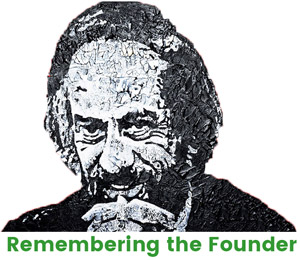A global forum for sustainable development
The global economy, which seems to have recovered fully from the recession that sharply reduced economic growth throughout the world in 2008, is now exhibiting robust growth in Gross National Product (GNP). But, there are several challenges ahead, including a possible reversal of globalisation through narrow protectionism. However, the greatest challenge is not economic but ecological in nature and relates to the urgent need for addressing the growing threat of climate change, widespread loss of biodiversity and extinction of species, damage to the earth’s ecosystems and large-scale acidification and pollution of the oceans. Clearly, the solution does not lie only in the many agreements signed under the United Nations, but in concerted actions to be undertaken by Governments at all levels as well as by civil society, academic and research institutions, and most importantly, by business organisations.
The World Economic Forum is held at Davos each year. The 2018 year gathering at the Swiss ski resort marked 10 years since Late Dr. R.K. Pachauri spoke at the opening session of Davos in 2008 along with the then President of Afghanistan, His Excellency Hamid Karzai, and the United States Secretary of State, Condoleezza Rice. The snow and ice of Davos in January of 2018 once again attracted all the high and mighty from across the globe, and political and business leaders, who participated, perhaps representing societies and companies responsible for a large majority of the global GNP.
Also, like in previous years, those who congregated in Davos, focused essentially on networking and discussing deals of relevance to their own business interests, and, of course, most of those who participated wanted to be seen and heard through the media, and to make it known that they too had been on the pilgrimage to this pinnacle of global economic power.
Significantly, the poster boy in Davos in 2018 was US President Donald Trump, who was introduced by Klaus Schwab, the Forum’s founder and Executive Chairman with the words: “The role of the United States and your personal leadership is absolutely essential. For this reason, your message here has tremendous relevance. Of course, I’m aware that your strong leadership is open to misconceptions and biased interpretations.”
It is certainly surprising and a matter of great concern that this powerful Forum hardly pays anything more than lip service to the serious problems facing this planet through the impacts of climate change, the rapid degradation of the earth’s ecosystems both on land and in the ocean as well as the growing disparities between rich and poor. Ecological damage is now exhibiting serious economic losses as well. In this, as in other world forums, where some of the serious threats to the planet were referred to in previous years, most business groupings and meetings basically put forward the excuse that with the economic slowdown across the world, resources were not available for addressing the challenge of climate change. This year, the global economy has generally been functioning well, and there is no more excuse for delaying action to deal with climate change and solutions to other planetary problems.
A recent issue of Fortune, a magazine that is of interest to and read by most business leaders, has stated that extreme weather is becoming more common and the economic impact is soaring, according to data derived from the National Oceanic and Atmospheric Administration (NOAA) of the United States, the cumulative cost of 16 weather events in 2017 was $306 billion, surpassing the previous one-year record of $215 billion set in 2005.
Several concerned voices have highlighted the economic case for climate action in the United States. One particular estimate states that the total climate-related economic losses and health costs in the United States averaged $240 billion a year over the past decade. It has also been projected that this annual cost will rise to $360 billion in the next 10 years. The impacts of climate change are not confined to economic losses. There is inestimable human suffering, including increased morbidity and mortality, and, of course, long term losses as a result of destruction of biodiversity and loss of species. In view of the continuing neglect of the most serious problems facing humanity and this planet by a large section of the business community, there is need for a very different platform being developed and a focused programme of activities being pursued distinct from what suits the short-term interests of business.
It is for this reason that the World Sustainable Development Forum (WSDF) has been established with a formal presence in three places in the world. The first global gathering of WSDF, albeit on a modest scale and without the grandeur and glamour of Davos, was held in Mexico on February 1 and 2, 2018.
The entire proceedings were a stimulating experience, and the general consensus reached by the distinguished gathering of the finest minds gathered at the Forum raised the importance of urgent action to deal with implementation of the Paris Agreement on climate change and Sustainable Development Goals adopted by the United Nations General Assembly. There was a dramatic note produced by a session involving very bright university and senior school students from Germany, North Africa, the Middle East, the US, Montenegro, Portugal, the United Kingdom and Mexico. This group impressed the participants with elaborate plans that they had drawn up and were in the process of implementing to reduce and recycle waste, cut down on the emissions of carbon dioxide, and in general concentrate on actions and values to promote sustainable development.
One of the speakers represented a children-driven global initiative called ‘Plant for the Planet’, which is engaged in planting billions of trees worldwide. Grassroots efforts are key to success in this arena, and the WSDF will motivate various groups to initiate action.
WSDF would provide a vibrant platform for bringing all stakeholders together to move away from patterns of economic growth which ignore the damage and destruction to our planet as a consequence of current patterns of production and consumption. The gathering at Mexico City last year heard five former Heads of State and Heads of Government (including a Nobel Laureate), celebrities like Arnold Schwarzenegger and Leonardo DiCaprio and several intellectuals as well as representatives of business and industry. Those who were there, felt inspired to act in their own spheres of activity, which covered every element of human endeavor. The WSDF has a steep road ahead but is now the only show in town which addresses the long neglected but oft-repeated challenge of sustainability on a worldwide basis.


